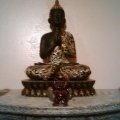Truthfulness
 Jeroen
Luminous beings are we, not this crude matterNetherlands Veteran
Jeroen
Luminous beings are we, not this crude matterNetherlands Veteran
My experience has been that truthfulness, the habit you have of speaking and hearing truth, is a powerful factor in discovering and adhering to the dharma. When you have been truthful for a long time, even a small lie feels uncomfortable, and you begin to hear things that chime with what you understand of the truth within. It’s like an intuitive understanding develops within you, which rings a little bell of truthfulness when you come across some sentence that speaks to you.
Habitual lying damages this instinct. Lying for convenience, or in order to save face, are not major falsehoods, but they erode the sense of truthfulness within you. It is like your inner space has a certain purity, and lies pollute it. Of course this is also true for the mind, if you fill it with the things you feel are true your sense of the world is interrelated within itself.
Even lies of omission can be a gateway for unpleasantness. When you fail to acknowledge someone’s good work, you leave the door open for others to take credit. So it suits you to take an interest in these things, to be caring and careful of those around you. It doesn’t mean one should confess every wrongdoing, but it is good to live lovingly, in compassion for others.
It is the inner truthfulness that you would do well to guard. It will help you gain clarity when examining something within, when you are trying to use your inner resources to see what is important to you. But inner and outer truthfulness are linked, you cannot ignore one in favour of the other.
Just my 2c for today...
Namasté









Comments
"There can be no Peace in your heart, if the things you say, are different to the things you do."
Will have to look up who said this but in essence, it echoes your sentiment....
As some of you know, I have no integrity. I regularly post on truth but never speak it ... I believe that is impossible anyway ...
However being a Mahayana advocate, I present myself as a bow or knot. Which means having to untangle to loose the arrow ...
How then do we best allude to the unsaid? The Truth if you will ... ?
You Mahayana folk! Always speaking in riddles.....
Your attempts to point at the moon are always appreciated
Mahayana, hinayana, it doesn’t matter very much, as long as we get more enlightened beings in the world. We can only create a sea-change in the world mentality if there are enough...
The ineffable is sometimes best approached in a few small and simple steps. The leap to understanding is left to the student.
"Speak your truth. Tell it like it is. There is no reason to do otherwise."
Lama Surya Das, 'Awakening the Buddha Within".
It’s tricky... everyone has something which they consider their truth, but does that mean that they have any kind of handle on the truth... and if everyone started speaking these things, we would no longer be able to see the trees for the forest. So it comes to a personal examination, is my truth any kind of a real truth at all? Can I serve everyone better by speaking or remaining silent?
There are only 4 Truths that I have found to be indisputable. I would label these THE truths.
Everything I believe to be correct is either 'a' or 'my' truth.
The best thing about holding a fact as true for you, is that you should also be aware it can be a moveable feast. Personal rock-solid convictions are largely subjective; they are edifices built on shifting sands. Providing a person can understand that, then their stance is entirely valid, unless proven otherwise.
Which is always possible.
Unenlightened Beings cling to their versions of reality; Enlightened beings need no such tether.
That's the subtle difference, between Our Truth, and theirs.
Good post from @federica
@Kerome is right about small steps, or a direction, which includes integrity but not rigidity which @federica mentions.
In Tantra (a fantastical post Mahayana belief system), we create a raft of skilful means, only to abandon them. All in good time.
We are in the truth/path of dharma not confined but relaxing in our ignorance, letting it exhaust itself and slip away ... In this sense we have to remain focussed on Truth as an Absolute, revealed like light that always shines but is obscured by selfies and zombie behaviour.
This is why the Mahayana say everyone is enlightened, they just don't realise it ...
Watch for the signs ... at least in yourself ...
https://www.thedailymeditation.com/do-you-share-these-10-signs-of-an-enlightened-person
top tip for the day:
I agree. I think honesty is the most important virtue because it is through being honest that we are able to truly grow emotionally, spiritually, etc. When we are open to being wrong, to making mistakes, to new ideas, etc., we gain knowledge, real knowledge. We learn more from our mistakes than we do from anything else. I hear that is why hospitals ask potential brain surgeons questions like "Have you ever made a mistake" and "If so, what would you do differently next time" to determine who would make a good surgeon and who would not. It is also through honesty that we can show the world our commitment to the truth, whether relative or ultimate. It is interesting to note that in all of the past-life stories of the Buddha, which are essentially morality tales that detail the Buddha's quest for enlightenment during preceding lives, the precept against lying is the only precept he never broke. In addition, he once said to his son, Rahula, "… when anyone feels no shame in telling a deliberate lie, there is no evil, I tell you, he will not do" (MN 61).
Another reason I think it is so important is that dhamma itself is truth, "things as they actually are." And as Robert Trivers points out in the introduction to The Selfish Gene, deceit is arguably fundamental in animal communication, therefore "there must be strong selection to spot deception and this ought, in turn, to select for a degree of self-deception, rendering some facts and motives unconscious so as not to betray - by the subtle signs of self-knowledge - the deception being practiced." In essence, we have evolved to be good liars because it is advantageous for survival and the propagation of genes. So many times, we may be unaware of our true intentions and motives, therefore the Buddha's focus on contemplation and self-reflection and truthfulness takes on even more importance. At least some of our motivations, influenced by a subtle form of selfishness (original sin?), lay hidden within us. This is akin to the Buddhist teaching that many of our actions are conditioned/coloured by greed, aversion, and delusion (i.e., selfishness and self-deception); and one of the Buddha's insights was that we can master these mental processes of conditionality in such a way as to 'go against the stream' of craving (tahna, which here can be seen as the influence of genetic selfishness on human psychology) and ultimately transcend craving altogether. As Dawkins puts it, "Our brains have evolved to the point where we are capable of rebelling against our selfish genes;" and the Buddha was one of the greatest revolutionaries in this regard.
Well said @Jason
Our human karma is something we work with and against (this is the spiritual meaning of Jihad in Sufism). It is the meaning of sin in mystical Christianity. I find the clearest understanding of the turnaround is in Buddhism:
We might put it this way ... our form has to be emptied. The emptiness is formed ... through practice ...
It is true -like Kerome said- that the more I practice truthfulness, small lies become quite uncomfortable, even to the point I have to correct myself. "Actually that is not how it happened / Nah, that was not true /". A bit embarrassing at the beginning, but slowly these instances are not repeating themselves.
This has also lead towards a deeper insight regarding why, why are they -lies- so relevant that I must build / maintain these painfully complex and unwholesome constructions.
I remember once I talked to my mother about lies and lying in general. She is a doctor and quite skilled in almost all fields.. And completed her PhD in pediatric pneumology in 2016 at the age of 56! Anyways... we were talking about the brain and she talked about how lies are so complex, very complex processes which are mentally exhausting.
This struck me and reminded me of myself. Those moments of tension in which you believe your tales are about to be swept away by the broom of Truth. The broom being operated by a friend or family relative, who didn't know what script / construction you gave to some other person, excuse to your boss, etc......you name it.
Another small story of my mother was once when a co-worker was telling her why didn't she "trick" the tax collecting office, explaining to her many of these "easy tricks". My mother smiled and said:
"It is easier to just be honest than to lie. I like to sleep at night."
Simple exercise, but hard. Just like following the breath without any discursive thoughts.
May all beings be happy and truthful!
As the saying goes: Liars have to have good memories...
I was brought up to always speak the truth. It is a fault. I had to learn white lies, tact and kind speech. The truth can be brutal.
Developing skilful speech, such as Noble Silence and genuine kindness, means presenting nourishing truth ... If presenting what is not currently understandable, we are colluding in hypocrisy.
Examining truthfulness for how it applies within
understanding/thought/speech/action/livelihood/effort/mindfulness & concentration
has been helpful to me.
To be quite honest, I tell porkies/lies... not with the intention to harm others, just in such a way to do the least harm possible....as the situations arise....
In one of my jobs, on behalf of my clients I often have to negotiate with their creditors and every now and again the conventional truth may have to be slightly stretched by both parties, as the situation evolves ...to balance the truth so to speak...It's like a bargaining game....calling each other's bluff...
The truth is, more often than not, that the client can ill afford to pay the amount the creditor is asking for in repayments...whereas the creditor can afford to take a lesser amount in repayment installments...in other words they eventually get the money they are owed...often with interest...
If the truth be told....the truth as it stands is only as it stands in this present moment in time...and from what I gather, like all component things, conventional truths have a habit of changing to suit the times....
In other words the conventional Truth flux
...and "I" try to remain true to my fluctuating sense of self ...
"Everything evolves...will come to mean nothing is true"
~Nietzsche~
....Now ain't that the truth.....
I have found this to be true myself, and it's one of the reasons I hold MN 61, which stresses truthfulness and mindfulness/self-reflection, in such high regard. It constantly reminds me to be mindful of my actions and whether or not they're causing harm, which sounds simplistic and easy, but is something that I've found to be easy to overlook. We tend to focus a lot on our immediate experiences and feelings and not revisit matters and the continuing consequences our actions give rise to, or dig into the true, underlying intentions that gave rise to them in the first place. And oftentimes, it can take a while for some of those results to manifest and for ourselves to be spiritually mature enough to see and understand them for what they are.
It also highlights the importance of honesty, which is another important factor of the path and intimately connected with the aforementioned mindfulness and discernment. Besides the overt harm that lying can do, not being committed to honesty can make us even more ignorant of our true intentions and their results because, as it is, we lie a lot to ourselves about our motives. And reflecting on this sutta often has helped me to better see my intentions and how they influence my actions and what I expect to come from them. And that kind of constant self-reflection has been extremely important in my own practice, giving me the space to grow and open my mind to new things rather than always thinking and acting on autopilot, which usually means in the direction of the defilements and suffering and not my long-term welfare and happiness.
And over time, I've found myself experiencing the same sort of discomfort of being untruthful as a result, which helps me to then focus on it and my actions and not just let them slide and go unexamined.
Thinking about the differing sort of philosophical values out there, justice, beauty, order, balance, purity, liberty, etc. I think I place truth at the top. I think if something isn't true, or accurate first it probably doesn't really qualify as any of the other values either. If you base another value on an inaccurate foundation, does it really measure up?
In regards to my own truthfulness I think I'm close to @Shoshin in her post. I don't like absolutes, I think its all a balance. Sometimes small sacrifices to one value can bring greater rewards to another.
I think this is why I am worried about the current state of today's media environment. The truth is too readily sacrificed to other concerns and we are now living in a world where we can't even agree on basic facts. The sacrifices to truth are becoming larger and larger in service to the agenda's of other values.
Regarding balancing values, there is an idea in mathematics around diminishing returns that I like to apply. As a rough example say it takes 10% effort to get 80% of the juice from an orange, it then takes 20% more effort to get the next 10% juice and 30% to get 5% more juice. So we can spend 10% of our value budget to get 80% truth, 10% to get 80% justice, 10% to get 80% order, etc. Or we can spend 50% of our energy to get 95% of a value but have to make ever increasing sacrifices to other important values. That's all just a simplistic mathematical abstraction though. In the real world values often conflict or harmonize and I'm sure the percentages aren't real.
I don't know if that makes any sense. I didn't expect to head off in this direction when I started, I just think I'm trying to say that I think think truth is my most important value but I also think absolutes lead to unnecessary sacrifices and bad outcomes so balance is always important too.
Although J.Krishnamurti was not a Buddhist, I have always remember his written comment: "Always tell the truth, but never tell an unkind truth".
The Lamas never correct or chastise someone. If I am going on about something in ignorance, they just silently look away. And I have found this to be a useful thing to do, especially talking with family over the phone and they're getting upset over something. They cannot see that I am looking away .. but it helps ME refrain from saying unkind things.
The other thing that the Lamas do which I have taken to heart .. when someone is trying to preach to them or tell them that they (the Lama) is wrong ... the Lama listens quietly and then evenly says, "I'll have to think about that".
Again .. not arguing. Not trying to change others.
It is interesting that honesty, integrity and truth can be linked skilfully to compassion and kindness. In humility we may realise we are not as truthful as might be, without practice. Every positive quality we can unfold from the lotus, will release its neighbour.
Unfold. Bloom.
I came across a segment someone posted elsewhere by John Stuart Mill that I think is really valuable in our increasingly polarized world.
For the most part( in the ultimate sense) we're all living the dream AKA life in Samsara-tis the nature of the beast, which means we're all living the lie ( living in dream-like states of illusion-distortion of the senses, where more often than not, through conditioning we willingly partake in the lie AKA the cycle of life & death )...
So (again in the ultimate sense) perhaps Truthfulness is when one is willing to awake from the dream/lie....
After all....it's not call the "Four Noble Truths" for nothing.....
I've always felt that those of us in positions of public trust should be held to a fairly high standard when it comes to truth and perspective. That is we should be open to different perspectives but adhere to telling the truth.
Simply being wrong is one thing but to knowingly lie to sway consensus or to profit from the misinformation should be grounds for automatic and immediate dismissal from any public position of trust. Be they a teacher paid with public funds, an officer of the law or even a lawyer, judge, doctor or politician.
In the ago of information, misinformation is a crime.
In my experience, what I have concluded is that the only person you can ever be fully truthful with is yourself. I believe in being honest as much as possible with everyone but... "as much as possible" - this is debatable given what life is... life being, well, life.
I believe, let me put it this way, in making the "right effort" towards a truthful existence (I guess I'm borrowing from a Buddhist principle, though I haven't looked deeply into it actually... or I did but a while ago and have since forgot..). Anyway, what I mean is that one should be receptive to growing in one's virtuous living, practicing truthfulness among other virtues, but one should not always hold himself to such a high standard, ESPECIALLY if one's life circumstances are such that they strongly militate against a pure life style. Depending on one's living condition, I think one has the license to tell a lie once in a while, or even live something of a double life in extreme cases. Not just to save face, but even for a kind of diplomacy. Otherwise, one may become overwhelmed by a host of stressful factors from people and things. Of course, being embroiled in lies is another thing which may cause even greater stress. But the point is only you yourself can properly adjudicate how to live your life, what moves to make in life in other words. Only you yourself can find the right balance.....
I'll come quietly ... and plead guilty.
If you take control over those things you can, you are better able to negotiate the unexpected.
Judge Judy
https://www.brainyquote.com/quotes/judy_sheindlin_853708
Lock her up! Lock her up! ... Prisons are open? Criminals in the White House?
Tee Hee ...
I wanted to paraphrase something that I had just heard about the process (epistemology) the modern world uses to decide what is true.
This notion is the basis of the scientific method but also runs pretty counter to traditional Buddhist notions of what we can say is true... kind of.
There is also the important idea in Buddhism that we are meant to test the teachings first before accepting them. I think that works for most of the psychological and spiritual dimensions but not so much for the hidden metaphysical claims.
That really speaks to me.
If I were truthful, everyone would hate me (apart from my cat), I'd have no work, and many would harm me.
I can't afford to have any more teeth knocked out.
What a mess.
Imagining @Tosh doing his best Jack Nicholson impression 'You can't handle the Truth!"
I went hiking/wild camping with Wor Lass at the weekend; we did nearly 50 miles from Severn Beach to Gloucester, along the Severn Way.
On the 2nd night in the tent, after very little sleep the 1st night, I said to Wor Lass, "If I snore, wake me up and tell me". Because she had complained I'd snored the 1st night.
So I'm sound asleep and she roughly shakes me with a sharp "You're snoring!!!" Now I didn't tell the truth and say "You rotten rat-bag, I was enjoying that sleep!", what I actually said was "Thank you, darling!" I lied; I didn't mean it; I just wanted to sound gracious.
She then closed her eyes and 30 seconds later she started snoring.
True story.
It's nice country in those parts @Tosh
My wife's grandparents lived in Sharpness. We were able to visit them once about 20 years ago. Haven't been back to the UK since.
I remember Sharpness, @Walker; quaint place and we slept in a boat graveyard not far from there, near the canal.